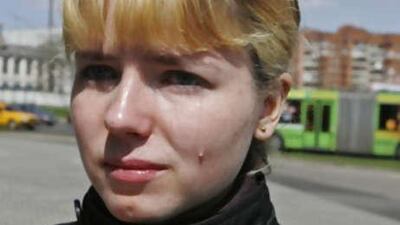MINSK // Kasya Markouskaya has just been told that when she graduates this spring with a journalism degree she will be sent to work for two years in a town that was badly contaminated when the Chernobyl nuclear reactor exploded in 1986. Several thousand Belarusian university graduates are being sent against their will to areas hit by radiation 22 years ago. Some, including Ms Markouskaya, protested against the work assignments yesterday as part of an opposition march held annually on the anniversary of the explosion.
They take a risk challenging Alexander Lukashenko, the Belarus president, dubbed Europe's last dictator for his refusal to tolerate any dissent in the former Soviet republic. His government has declared these regions no longer hazardous. Radiation levels have declined substantially in most areas near Chernobyl, but scientists disagree on the level of risk. Some doctors who work in towns downwind from Chernobyl say the health effects are still being felt, and students being sent into these areas are afraid.
Ms Markouskaya, 23, is particularly worried because since childhood she has suffered from an enlarged thyroid, which doctors say puts her at increased risk for thyroid cancer, an illness linked to radiation poisoning. "My situation is little different from that of a slave who has been forced to do dangerous work," said Ms Markouskaya, who has been assigned to a government-owned paper in Buda-Koshelyova, 100km north of Chernobyl.
If she refuses, she will either be stripped of her diploma or required to reimburse the state for the full cost of her education. When she entered university, there were no such strings attached. The work assignments began last year, and about one quarter of this year's 21,000 graduates are being sent to the contaminated areas. Alexander Kosinets, the deputy prime minister, said at parliamentary hearings on Friday that if the work assignments were cancelled, these regions would be left without the doctors, teachers, agricultural workers and other specialists they need.
Belarus suffered the most from the explosion of the Chernobyl reactor in neighbouring Ukraine. Radiation was spewed over 23 per cent of Belarusian territory, where 1.5 to two million of the nation's 10m people now live. Many people from these areas moved away; Mr Lukashenko now wants to repopulate them so agriculture and industry can be revived. Only towns within 30km of the reactor are officially still considered unsafe. Critics say this has allowed the government to reduce spending on cleaning up the damage.
Buda-Koshelyovo is among more than 1,000 cities and towns that the government has removed from the danger list. Doctors and environmentalists, however, say radiation dangers remain high. "Living in the contaminated areas is linked to a huge health risk," said Professor Ivan Nikitchenko, a member of the Belarusian Academy of Sciences and a leader of an anti-nuclear organisation. Statistics about illness in the contaminated areas have been classified by the government. But doctors are in high demand.
Alexander Khvesko, the head of a Buda-Koshelyovo clinic, said 10 doctors were sent last year after completing their studies and 30 more are expected this year. Some of the young professionals sent to contaminated regions last year have already fled. Alexander Yadrentsev, editor of the Buda-Koshelyovo newspaper Avangard, said Ms Markouskaya is to replace a journalism graduate sent last year who has returned home to Minsk.
If she leaves, too, the editor said he will be able to count on another "conscript" next year. "The mandatory work assignments have become like the army," Mr Yadrentsev said. About 800 graduates have refused to take up their work assignments this year, the education ministry said. Court cases have been brought against 99 of them. The opposition calls the situation a return to the Soviet era of silence.
"If an accident occurred today, we also would not know the truth," said Gennady Grushevoi, who heads the charity fund Children of Chernobyl. He was one of the organisers of the first opposition march on the Chernobyl anniversary in 1989. Alexander Milinkevich, a Belarusian opposition leader and an organiser of this year's march, was arrested on Thursday. Activists said the authorities were cracking down on the opposition ahead of yesterday's protest.
Last year, police arrested some opposition activists and beat others after the march had finished. Ms Markouskaya said she was not afraid. "The government can't do anything worse to me," she said. * Associated Press

